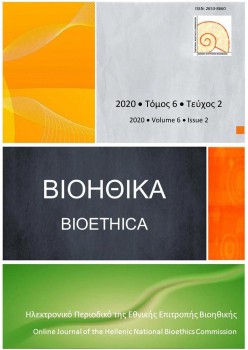CRISPR, μια νέα τεχνολογία γενετικής παρέμβασης: Πρόταση αξιοποίησης σε ένα δημόσιο σύστημα υγείας
Résumé
Οι νέες τεχνολογίες γενετικής παρέμβασης στο ανθρώπινο γονιδίωμα μέσω της χρήσης του συστήματος των Clustered Regularly Interspaced Short Palindromic Repeats και των σχετιζόμενων νουκλεασών (CRISPR) έχουν γίνει αντικείμενο προβληματισμού μεταξύ βιο-επιστημόνων, φιλοσόφων και νομικών. Το παρόν κείμενο, αφού λάβει υπ’ όψιν την υπάρχουσα συζήτηση σχετικά με τα βιοηθικά ζητήματα που αναδεικνύονται από τις εφαρμογές του CRISPR στον άνθρωπο, διατυπώνει ένα προβληματισμό σχετικά με το πώς θεραπείες που βασίζονται σε αυτό το καινοτόμο εργαλείο επεξεργασίας γονιδίων θα μπορούσαν να αξιοποιηθούν από ένα δημόσιο σύστημα υγείας. Για το σκοπό αυτό προτείνει μια μέθοδο ακριβοδίκαιης και βιώσιμης ένταξης αυτών των νέων θεραπειών στο σύστημα παροχών ενός δημόσιου συστήματος υγείας.
Article Details
- Comment citer
-
Kolisis (Νικόλαος Κολίσης) N. (2020). CRISPR, μια νέα τεχνολογία γενετικής παρέμβασης: Πρόταση αξιοποίησης σε ένα δημόσιο σύστημα υγείας. Bioethica, 6(2), 30–40. https://doi.org/10.12681/bioeth.24843
- Rubrique
- Original Articles

Ce travail est disponible sous la licence Creative Commons Attribution 4.0 International .
Authors who publish with this journal agree to the following terms:
- Authors retain copyright and grant the journal right of first publication with the work simultaneously licensed under a Creative Commons Attribution CC BY 4.0 License, which allows for immediate free access to the work and permits any user to read, download, copy, distribute, print, search, or link to the full texts of articles, crawl them for indexing, pass them as data to software, or use them for any other lawful purpose. Appropriate credit must be given by citing the author(s) and the original publication in this journal.
- Authors are able to enter into separate, additional contractual arrangements for the non-exclusive distribution of the journal's published version of the work (e.g. post it to an institutional repository or publish it in a book), with an acknowledgement of its initial publication in this journal.
We encourage authors to deposit their articles, as well as data underlying the publications, in institutional and/or other appropriate subject repositories.
Bioethica permits and encourages authors to archive the final publication pdf in institutional (e.g. the repository of the National Hellenic Research Foundation) or other appropriate subject repositories (e.g. SSOAR repository for social sciences), in compliance with institutional and/or funder open access policies, after publication in the BIOETHICA. Authors must provide bibliographic details that credit publication in the journal, as well as related funding details (when applicable).
Lists of institutional and other subject-based academic open access repositories can be found listed by country at the registry http://opendoar.org/countrylist.php
If your institution does not possess a repository you may deposit a copy of your paper at no cost with www.zenodo.org , the repository supported for open access research in the EU by the European Commission, through the project OpenAIRE (www.openaire.eu )



